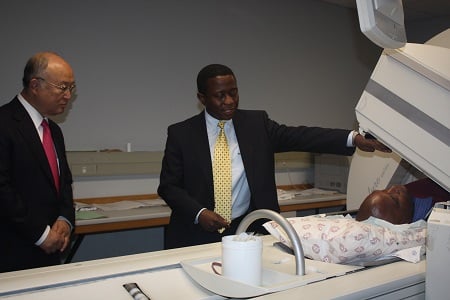Posted on March 26, 2015
The Department of Nuclear Medicine at the University of Pretoria (UP), which collaborates with Steve Biko Academic Hospital, received accolades from the Director-General of the International Atomic Energy Agency (IAEA), Mr Yukiya Amano, who recognised the Department for its extensive research into improving the lives of cancer patients and the training offered to medical nuclear physicists from the African region.
The IAEA is an international body that regulates and funds all nuclear-related activities, including nuclear medicine, energy and even the manufacture of bombs. The Agency helps countries to use nuclear and isotopic techniques to promote sustainable development objectives in agriculture, human health, water resource management, the marine environment and industrial applications. It also provides a strong, sustainable and visible global nuclear safety and security framework to protect people and the environment from the harmful effects of ionising radiation.
After a meeting with State President Jacob Zuma, Mr Amano visited Steve Biko Hospital to learn more about the research done by the Department of Nuclear Medicine. He also visited the energy-regulator company Necsa and the Safari 1 reactor, which celebrated its 50th anniversary. This reactor provides the Department of Nuclear Medicine with medical isotones, which are used in cancer research.

Prof Mike Sathekge (right) demonstrates to Mr Yukiya Amano how nuclear medicine scans are used to take readings on cancer patients
The IAEA decided to focus on the nuclear applications that will assist cancer control in developing countries in Africa, Mr Amano said. ‘The Agency’s activities in the area of nuclear medicine have increased and we are focusing on many nuclear applications, particularly with regard to the treatment of cancer, which remains a very important issue not only on the African continent, but also in Asia and Latin America.’ He commended the Department of Nuclear Medicine for its achievements, in particular for helping other African countries, and added: ‘Many countries are depending on your facilities and your high standard of professionalism, as well as the training you offer. We regard South Africa as a very important partner in cancer control in developing countries. This relationship is important and can be a model for other countries.’
He called on African scientists and leaders to increase cancer research, which did not generally received the same attention as communicable diseases.
The Head of the Department of Nuclear Medicine, Prof Mike Sathekge, gave a presentation on his using of isotopes in research on the treatment of HIV/Aids, TB and cancer and said that the Department uses innovation in science to make a contribution to providing the quality health that comes with science. ‘As the Department of Nuclear Medicine, we are ensuring that we are taking science to the heart of health through thorough research on the diseases that impact the lives of the many people,’ he said.
Prof Sathekge referred to the fact that his Department is used by the IAEA to train researchers from other countries, and expressed his appreciation for the international recognition of their research by their peers.
Copyright © University of Pretoria 2025. All rights reserved.
Get Social With Us
Download the UP Mobile App